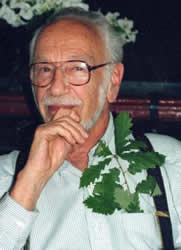

|

|
IN MEMORIAM
David Gale
Professor of Mathematics, Economics, and
Industrial Engineering and Operations Research, Emeritus
UC Berkeley
1921 – 2008
David Gale, a professor emeritus of mathematics at the University of California, Berkeley, and a puzzle lover who made fundamental contributions to economics and game theory, died March 7, 2008, following a heart attack.
David’s “intellectual depth, originality of insight, and thorough liveliness were apparent from the beginning and have remained a source of joy and inspiration to all of us. His life’s influence is a permanent heritage,” wrote Kenneth Arrow, professor emeritus of economics at Stanford University and 1972 winner of the Nobel Prize in economics.
Gale was born December 13, 1921, in Manhattan and grew up in and around New York City. He attended Swarthmore College and graduated with a B.A. in 1943, obtained an M.A. from the University of Michigan in 1947, and earned his Ph.D. from Princeton University in 1949.
After a yearlong stint as an instructor at Princeton, he joined the Brown University mathematics department in 1950, where he remained until 1965 except for a year’s sabbatical at the RAND Corporation in Santa Monica, California. Following a yearlong Miller Professorship at UC Berkeley, he was appointed a professor in both mathematics and operations research in 1966. He also was appointed to the economics faculty in 1967.
For nearly 60 years, Gale played a leading role in developing theory of fundamental importance to economic and operations research. In particular, he authored papers in game theory and mathematical programming that have had a lasting impact. In addition, he was renowned for his ability to present his results in short papers combining precision and rigor with elegant style.
Gale’s 1960 book, The Theory of Linear Economic Models, is a widely used reference work on linear optimization that brought to a broad audience ideas developed in the 1950s by Gale and his coauthors Harold W. Kuhn and Albert W. Tucker. In recognition of this work, they shared the 1980 John von Neumann Theory Prize (for fundamental contributions to operations research). According to the prize citation, “Their research played a seminal role in laying the foundations of game theory, linear and non-linear programming—work that continues to be of fundamental importance to modern operations research and management science.”
With Lloyd S. Shapley, now professor emeritus of mathematics and economics at the University of California, Los Angeles, Gale published an influential paper on the so-called stable matching or stable marriage problem. Gale and Shapley proved that, given an equal number of men and women who rank one another in terms of romantic interest, it is possible so to pair them in marriage that no two people would rather be married to each other than to their partners. They also provided an algorithmic procedure to find such a stable marriage. Gale and Shapley’s theoretical work on this problem legitimized a procedure used to match newly graduated doctors to hospital residency programs. The paper generated an enormous literature, and variations of the matching algorithm are used to match students to schools.
Sometime in the ‘70s, Gale became convinced that the world needed a hands-on math museum, and he constructed at home several rudimentary exhibits and puzzles out of bicycle chains, rubber, and wood to demonstrate principles of mathematics and geometry. In 2003, he translated this idea to the Internet as “MathSite” (http://mathsite.math.berkeley.edu), which he promoted as “an interactive source for seeing, hearing, doing mathematics.” For this he received the 2006 Pirelli Internetional Award for multimedia communication of mathematics .
Gale also invented mathematical games, including Bridge-It, also known as the “Game of Gale,” and Chomp, which can be played with a bar of chocolate.
After his retirement from teaching, Gale began writing a recreational math column in the magazine Mathematical Intelligencer. He collected these columns in his 1998 book, Tracking the Automatic Ant and Other Mathematical Explorations.
Gale was elected to the National Academy of Sciences in 1983, received the Lester Ford Prize (for outstanding mathematical exposition) in 1980, and was named a fellow of the Econometric Society, the Center for Advanced Study in Behavioral Sciences, and the American Academy of Arts and Sciences. He received a second Miller Professorship in 1971; a Fulbright Research Fellowship in Denmark in 1953 (where he met his former wife Julie B. Skeby); and two Guggenheim Fellowships, in 1962 and 1981.
Gale was an avid composer of chess puzzles, skier, tennis player, traveler and jazz aficionado.
He lived in Berkeley and in Paris, France, with his partner Sandra Gilbert, renowned feminist literary scholar and poet. He had three daughters (Kirsten Gale Cutler, Karen Gale, and Katharine Gale), and two grandsons.
Ilan Adler
Jacob Feldman
Joel Sobe